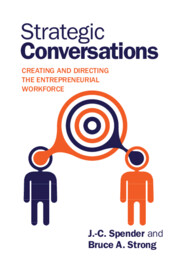Book contents
- Frontmatter
- Contents
- List of figures
- List of tables
- Acknowledgements
- Preface
- 1 Introduction – what are strategic conversations?
- 2 The strategic conversations imperative
- 3 Strategic conversations in the wild
- 4 Engaging employees in management’s agenda
- 5 Strategizing and the leaders’ role
- 6 Putting strategic conversations into practice – innovation communities
- 7 Conversation trumps structure – new norms for dialog
- 8 Strategic conversations across geographies, generations, and the multitude
- 9 Engaging the world outside in the conversation
- 10 Creating a self-reinforcing innovation platform – collateral benefits
- 11 Measuring the future
- 12 Epilogue – on managing
- Further reading
- Notes
- Index
11 - Measuring the future
Published online by Cambridge University Press: 05 June 2014
- Frontmatter
- Contents
- List of figures
- List of tables
- Acknowledgements
- Preface
- 1 Introduction – what are strategic conversations?
- 2 The strategic conversations imperative
- 3 Strategic conversations in the wild
- 4 Engaging employees in management’s agenda
- 5 Strategizing and the leaders’ role
- 6 Putting strategic conversations into practice – innovation communities
- 7 Conversation trumps structure – new norms for dialog
- 8 Strategic conversations across geographies, generations, and the multitude
- 9 Engaging the world outside in the conversation
- 10 Creating a self-reinforcing innovation platform – collateral benefits
- 11 Measuring the future
- 12 Epilogue – on managing
- Further reading
- Notes
- Index
Summary
I don’t care how big and fast computers are, they’re not as big and fast as the world.
Herbert SimonBusiness model innovation isn’t chemistry. Add two parts management attention, five parts employee participation, and three parts customer involvement today, repeat the next day – and the results are likely to be different. One day you make millions from pet rocks. The next day you flop with New Coke. A few months later you reintroduce the old formula and make many more millions with Coke Classic. Who knew?
As maddening as it may be, entrepreneurs depend on this type of uncertainty. Economist Frank Knight famously stated that without uncertainty, there would be no opportunity to make a profit. No uncertainty, no entrepreneurs (or entrepreneurial workforce). Perfect markets (in which economists argue there could be no profits) rely upon perfect information. Not to worry, entrepreneurs, there is no such thing. Markets are not perfect, and uncertainty abounds. But uncertainty often makes measuring the inputs, outputs, and, most importantly, outcomes of strategic conversations more art than science. Given this fundamental difficulty, what managerial measures are appropriate? Is it enough to believe in the irrefutable benefits of strategic conversations – perhaps based on a book you’ve been reading – and throw up one’s hands and say it’s not worth the effort to measure what is most likely un-measurable?
- Type
- Chapter
- Information
- Strategic ConversationsCreating and Directing the Entrepreneurial Workforce, pp. 196 - 208Publisher: Cambridge University PressPrint publication year: 2014



